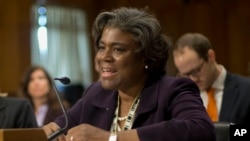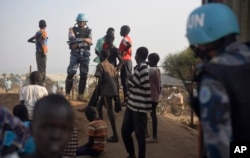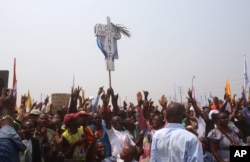The top U.S. diplomat for Africa says South Sudan’s peace process is not on track and government and rebel leaders need to resume negotiations.
In an exclusive interview, U.S. Assistant Secretary of State for African Affairs Linda Thomas-Greenfield told VOA “the people of South Sudan have suffered for too many years ... and two years after their independence, they are being tortured, harassed and forced into refugee status again because of lack of leadership of their two major leaders."
The world's youngest nation has been rocked by more than two-and-a-half years of ethnically charged fighting that has displaced over 2 million people, with nearly 1 million fleeing to other countries.
A peace deal between the government and the rebels a year ago has failed to end the conflict, and last month Juba was rocked by several days of heavy fighting between forces of President Salva Kiir and those loyal to his rival, Riek Machar.
Machar was first vice president in South Sudan’s transitional government but was replaced by another opposition figure, Taban Deng Gai, after going into hiding in mid-July. He was reported Thursday to be in the Democratic Republic of the Congo.
Thomas-Greenfield said, “In terms of appointment of individuals, we have to allow the South Sudan government to make those appointments. We, too, wonder why this decision was made. We are hoping there’s a possibility that Dr. Machar comes back to Juba and they are able to continue the process [that existed] before the situation occurred in July.”
The U.N. Security Council voted Friday to send a “regional protection force” to South Sudan, a move the opposition requested.
“The regional protection force has been created in response to the collapse of security in Juba, and it will remain until South Sudan's leaders take the steps necessary to provide that security for their own people,” said David Pressman, U.S. ambassador to the United Nations for special political affairs.
Thomas-Greenfield said the United States is committed to seeing the current situation end, while working closely with the Intergovernmental Authority on Development, an East Africa bloc, to implement the regional security force for Juba so parties can move the peace agreement forward.
U.S. Ambassador to South Sudan Molly Phee told VOA on Thursday that the deployment of the troops was not solely a U.S. exercise, but a partnership between the U.S. and IGAD, of which South Sudan is a member. She stressed that "American policy toward South Sudan and the people of South Sudan has been constant for decades. We have always wanted to support the people of South Sudan against oppression and discrimination."
She said accusations by South Sudanese officials that the United States was trying to undermine their country were "not true."
Killings in DRC
In the northeastern part of neighboring DRC, suspected rebels killed at least 51 civilians recently, adding to the tension mounting ahead of presidential elections. President Joseph Kabila’s term is due to expire, but observers believe he is trying to delay the election.
While DRC has one of the world’s largest U.N. peacekeeping forces, Thomas-Greenfield said that “in situations when people are bent on killing, even if we have U.N. troops, they are going to find a way until we as the international community and the countries themselves find a way of dealing with the root causes of these conflicts.”
She said the DRC’s problems are “the result of not dealing with situations that involve illicit distribution and trafficking of a country’s rich resources.”
Allowing the people through the democratic process to elect their leaders is the only solution in the DRC, she said.
In the first part of Kabila's 10 years in power, the DRC was "relatively peaceful," Thomas-Greenfield said.
"He has the opportunity now to take DRC back into another chapter, and that is to transition this government at the end of his term, allow for free, fair and transparent elections," she said. "That would be a legacy that no one in the history of the DRC has ever left.”
The DRC has borders with nine countries, some of which aren’t seen as examples of the best democracies in that region. Thomas-Greenfield, however, said she sees Kabila as a beacon of hope.
“I can be proven right or wrong, but Kabila is different and could be the role model," she said. "He doesn’t have to follow that route. He can establish his own road, his own path for his country.”






